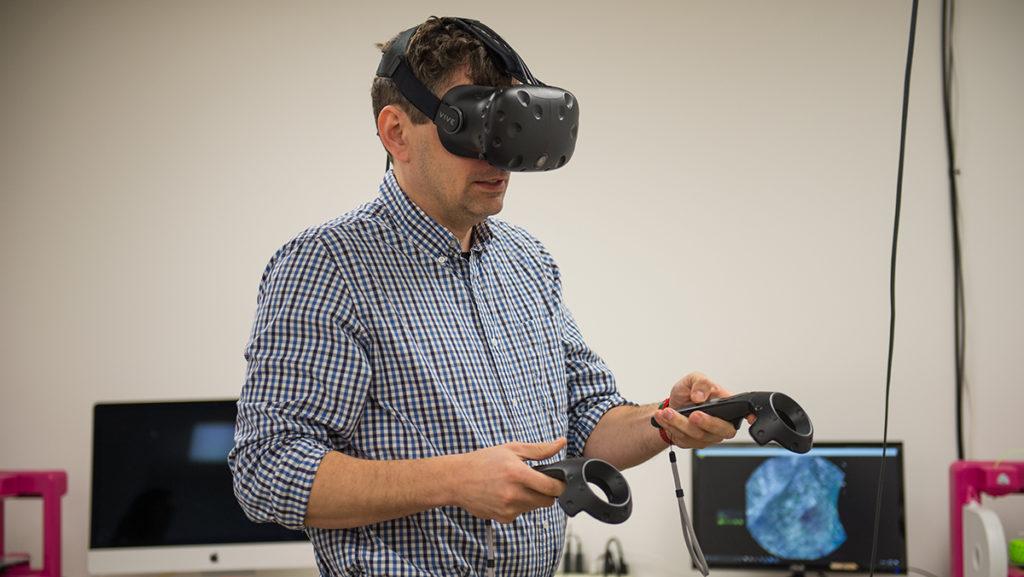Aided by investments in new virtual reality technology at Ithaca College, students are engaging in independent projects using the HTC Vive, a headset that allows users to immerse themselves in virtual environments and interact freely within them.
With the guidance of Sharon Stansfield, associate professor and chair of the Department of Computer Science; Edward Schneider, assistant professor in the Department of Strategic Communication; and Nathan Prestopnik, assistant professor in the Department of Computer Science, a select group of emerging media and computer science students is creating projects with the potential to help others. The students are able to use the Vive, which the departments bought for $800 and began using this fall, in the Williams Hall computer science lab and in the Roy H. Park School of Communications Innovation Lab.
Senior computer science major Noah Zheutlin said he became interested in VR technology at the college while helping Prestopnik with a game the assistant professor was designing.
This past fall, he conducted his senior project, exploring mental rotation and spatial reasoning with VR. The project tested people’s ability to control 3D shapes to determine which shape would fit into a specific slot. He tested participants using three different types of tests. The first test was done in VR, the second was done in traditional computer game style and the third used the Vandenberg mental rotation test, a paper test that challenges participants to match 3D shapes pictured at different angles.
“I wanted to find out if people think the same in a virtual space as they do in reality,” Zheutlin said.
This semester, he said, he plans to improve his senior project by using an Emotiv System — a device that reads brain signals — instead of controllers to see if people can rotate the shapes using their brain.
Though he said he only intended for the project to fulfill a senior requirement, it ended up landing him a job. After posting a clip of it on a discussion website, an employee from IBM contacted him saying IBM was doing similar research and wanted to use the code from his game as part of its study. Zheutlin agreed and soon got a call to interview for a paid VR research intern position with IBM.
“This project ended up being the start of my career,” he said. “I had no idea that when I posted it on Reddit, I would get contacted.”
Another student using the VR technology at the college is sophomore emerging media major Benjamin Klopcic. Klopcic said he was impressed by the technology after seeing Prestopnik demonstrate it in his class.
“I tried it out, and what captured me most was how immersive it is,” he said.
For his research project, Klopcic said he plans to set up a virtual environment where the user walks through a castle and can pick up and use objects with the ultimate goal of unlocking a gate. Klopcic said his goal is to master programming and game development skills for the Vive by the end of his project.
“It’s a fun way to learn how to develop for it, and then the plan is to use that for a more in–depth research project,” he said.
All three professors demonstrate VR technology in their classrooms. Through this, Prestopnik said he hopes to get students excited about the technology and inspired to do something with it. Knowing how to create and work with VR, he said, is a valuable skill.
“It becomes a nice portfolio calling card,” Prestopnik said. “It’s the type of thing that you can show a prospective employer.”
Schneider said incorporating the Vive into the classroom and learning to navigate VR is important to prepare students for jobs that don’t even exist yet, he said.
“I want this to be available in students’ tool belts,” he said.
Senior emerging media student Jimmy Wang helped Schneider build a computer for the Park School’s Innovation Lab that is advanced enough to run the Vive.
Wang said working with VR in the Innovation Lab helped him understand different aspects of what goes into making a program on VR, whether it be programming, coding or designing.
Evan Suma Rosenberg ’05 said his involvement in Stansfield’s VR Lab got him into graduate school. While at the college, Rosenberg worked with a team of students to design a VR game that can be used for therapy for children with motor impairments.
“We could create these magical experiences but actually use them for some social good,” Rosenberg said.
Between working in the lab and attending conferences, Rosenberg said, he was able to meet professionals and make connections that helped him find a graduate program where he could be successful.
Rosenberg now has a dual appointment working as a research assistant professor at both the Institute of Creative Technologies and in the Department of Computer Science at the University of Southern California.
He also said he is excited this technology is more available to students now at the college than when he was there, referencing the addition of more VR systems and the expansion of VR into the Park School.
“Getting experience using that technology, even if you don’t go into research, is something that will be potentially useful down the line after they graduate,” he said.








